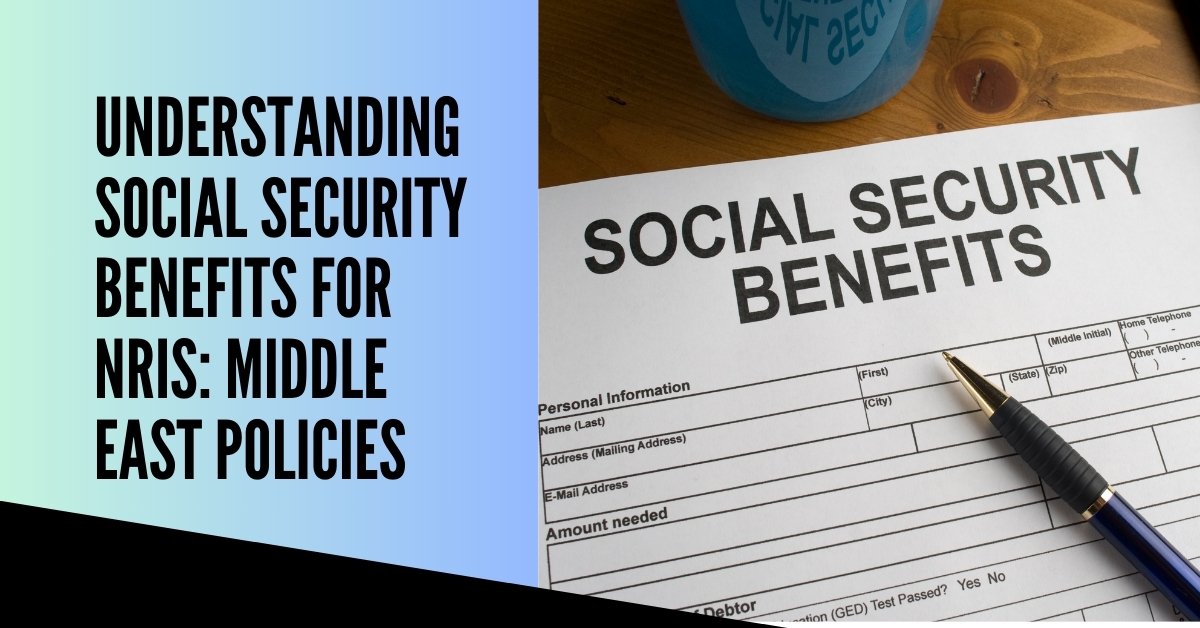Understanding Social Security Benefits for NRIs: Middle East Policies
As a global community with increasingly interconnected economies and populations, understanding the social security benefits available to non-resident Indian (NRI) citizens living in the Middle Eastern region is crucial.For Non-Resident Indians (NRIs) residing in the Middle East, understanding the policies and regulations surrounding Social Security benefits is essential for financial planning. In this comprehensive guide, we’ll explore the intricacies of Social Security benefits for NRIs in the Middle East, including eligibility criteria, contribution requirements, and strategies for maximizing benefits.
Understanding Social Security Benefits in the Middle East:
Social Security benefits in the Middle East vary depending on the country of residence and the specific policies implemented by each government. However, common features of Social Security systems in the region include:
- Pension Schemes: Many countries in the Middle East offer pension schemes to residents, including expatriates and NRIs, to provide financial support during retirement. These pension schemes may be funded by employer contributions, employee contributions, or a combination of both.
- End of Service Benefits: In addition to pension schemes, some Middle Eastern countries mandate end-of-service benefits for expatriate workers, including NRIs. These benefits are typically calculated based on the length of service and may include lump-sum payments or other forms of financial compensation upon termination of employment.
- Social Insurance Programs: Some Middle Eastern countries have social insurance programs that provide benefits such as healthcare coverage, disability benefits, and unemployment benefits to residents, including NRIs. These programs are funded through contributions from employers and employees and administered by government agencies.
Eligibility Criteria for NRIs:
The eligibility criteria for Social Security benefits in the Middle East vary depending on the specific policies of each country. However, NRIs typically need to meet certain residency and contribution requirements to qualify for benefits. Key eligibility criteria may include:
- Residency Status: NRIs must have legal residency status in the Middle Eastern country where they are seeking Social Security benefits. This may require holding a valid residency visa or work permit.
- Contribution History: NRIs may need to have a history of contributions to the Social Security system in the Middle Eastern country where they are seeking benefits. Contribution requirements may vary depending on factors such as employment status, income level, and length of residency.
- Age and Disability Status: Some Social Security benefits, such as retirement benefits and disability benefits, may have minimum age requirements or criteria related to the severity of disability.
What Are the Social Security Benefits for NRIs in the Middle East?
Non-Resident Indians (NRIs) residing in the Middle East have varying access to social security benefits depending on the country of residence. Here is an overview of the social security benefits available for NRIs in some Middle Eastern countries based on the provided sources:
1. United Arab Emirates (UAE)
Pension Scheme: Expatriates in the UAE are entitled to an end-of-service lump-sum pension based on their years of service. This pension is calculated upon resignation or completion of service.
Retirement Visa: NRIs looking to retire in Dubai can apply for a retirement visa by meeting specific criteria such as property investment, savings, or minimum monthly income.
2. Saudi Arabia
Social Insurance: Saudi Arabia operates a contributory system where both employees and employers contribute to social insurance schemes. Foreign workers may benefit from accident compensation and medical care coverage through their employer.
3. Kuwait
Social Security Coverage: Kuwait provides limited social security coverage to expatriate workers, including NRIs. Eligibility for benefits like old age pensions and disability allowances is based on factors such as years of service.
4. Qatar
Private Pension Plans: While Qatar does not offer universal social security benefits to expatriates, some multinational corporations provide supplementary retirement savings programs for their employees, including NRIs.
5. Bahrain
Mandatory Social Insurance: Bahrain mandates a social insurance scheme covering all employees, irrespective of nationality. Contributions from both employees and employers provide coverage for various contingencies like sickness, maternity, and old age.
6. Oman
Limited Coverage: Oman’s social security system primarily covers Omani nationals and select categories of expatriates. Private sector employees, including NRIs, generally do not receive direct governmental support for social protection.
How Can NRIs in the Middle East Apply for Social Security Benefits?
To apply for social security benefits as a Non-Resident Indian (NRI) in the Middle East, the process can vary depending on the specific country and the type of benefits sought.
Here are some general guidelines and resources that may be helpful:
Understand the Specific System: Research the social security system of the respective country to identify the types of benefits available and the eligibility criteria.
End-of-Service Gratuity: In the UAE, NRIs are entitled to an end-of-service lump sum payment based on their years of service, but they are not subject to social security contributions.
Apply Online: Visit the official websites of the relevant social security agencies to submit applications for benefits electronically.
Consult Local Authorities: Contact local embassies, consulates, or social security offices for guidance on applying for benefits and to verify the necessary documentation.
Provide Required Documentation: Prepare documents such as passports, visas, work permits, and proof of identity to complete the application process.
Follow Up: After submission, monitor the progress of your application and respond promptly to requests for additional information.
Conclusion:
In conclusion, understanding Social Security benefits for NRIs in the Middle East is essential for effective financial planning. By familiarizing themselves with the eligibility criteria, contribution requirements, and strategies for maximizing benefits, NRIs can ensure financial security during retirement or in times of disability. For personalized guidance and expert advice on optimizing Social Security benefits and retirement planning strategies, consider consulting a qualified NRI financial planner in the Middle East. With their specialized knowledge and expertise, they can help you navigate the intricacies of Social Security policies and secure a comfortable retirement.





